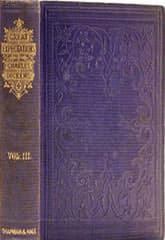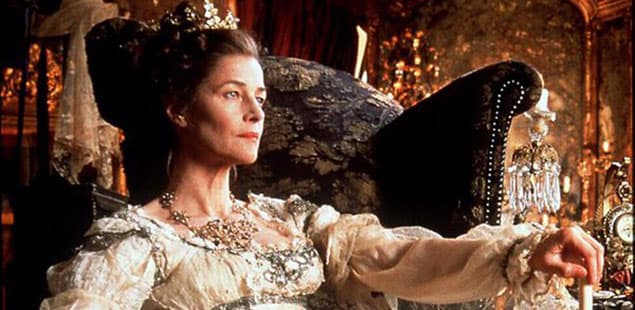Great Expectations
Critique • Other views • Quotes • Text • At the movies
 First edition
First editionFirst publication
1860–1861, serial in All the Year Round periodical
First book publication
1861 in three volumes
Literature form
Novel
Genres
Literary, Gothic romance
Writing language
English
Author's country
England
Length
Approx. 189,000 words

Charlotte Rampling rules as Miss Havisham in 1999 miniseries of Great Expectations
Exciting expectations
Great Expectations (1999): Television film, 168 minutes; director Julian Jarrold; writer Tony Marchant; featuring Ioan Gruffuld, Justine Waddell, Charlotte Rampling, Ian McDiarmid, Bernard Hill
Now for my own favourite. The 1999 Great Expectations, written by playwright Tony Marchant, is another British miniseries. This one was made for Masterpiece Theatre but, forget the MT stereotype—it rocks.
At under three hours it's somewhat shorter than the 1989 mini-series, but it's visually and viscerally a treat. Dickens has been rewritten, both to excise some subplots and to add more power in character relations.
Even though I knew the story inside out by this time, I got caught up in the heightened drama. It's not a museum-style preservation of a classic but, as the good doctor in another movie would say, "It's aliiive!"
To illustrate this, consider that many of the actors at first consideration would seem to be miscast. For example, Ioan Guffudd, just coming off the Horatio Hornblower series in which he was also titular lead, is surely too upright and heroic for the role of Dickens' hapless Pip. But after awhile I forgot the novel and I was involved with the character as written for the screen.
Same with Justine Waddell who gives us much more access to Estella's seemingly cold heart than Dickens did. Watching her, for the first time I actually cared about Estella.
Trailer for the 1999 television adaptation of Great Expectations.
Clive Russell seems initially too big and too old to be Joe Gargery (which is a switch), but again he comes to define the role anew. Respected stage actor and director Ian McDiarmid (popularly known as the emperor in the Star Wars saga) would seem too slight and refined for the novel's brusque lawyer Jaggers but, given only a handful of scenes, he brings out new dimensions in the character.
Bernard Hill (the captain in Titanic and more recently King Theoden in The The Lord of the Rings) is another terrific Magwitch, in the sense of terrifying in the early going and in the sense of very good in the character's softer final days.
Then, of course, there's the vital role of Miss Havisham. Charlotte Rampling would at first seem all wrong for Miss Havisham—too strong and lusty for the bitter old spinster. But she's effective in a different way from the great Joan Dickson. Not so much a decaying holdover from another time but a train wreck in progress. Like all the other characters in this miniseries, she is a nineteenth-century figure that we can understand as easily as a contemporary.
We also get in this film what may be most exciting river chase scene and fatal climax. With all the other improvements made, a new ending for the story is demanded. Not so different as to betray the source material, but one that makes sense in a way that the Dickens original never really did. Bittersweet may be the best word to describe it.
You won't leave this film happy, but you will leave it with understanding.
— Eric
Critique • Other views • Quotes • Text • At the movies

